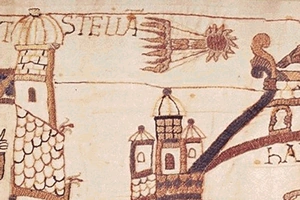 Lewis Barnavelt reads about Halley's Comet appearing over England during the Norman Invasion (The Sign of the Sinister Sorcerer; 19).
Lewis Barnavelt reads about Halley's Comet appearing over England during the Norman Invasion (The Sign of the Sinister Sorcerer; 19).In the spring of 1066, around Easter, a comet appeared that brought fear to the people of England. We now know that the comet-star in the sky was Halley's Comet making one of its 76-year cyclical appearances. Its appearance turned out to be bad luck for King Harold Godwinson, who died during the Battle of Hastings which celebrates its nonaquicentennial today, October 14, 1066. (That's 950 years).
The battle was fought between the Norman-French army of William, the Duke of Normandy, and an English army under the Anglo-Saxon Harold, beginning the Norman conquest of England. The background to the battle was the death of the childless King Edward the Confessor in January 1066, which set up a succession struggle between several claimants to his throne. Harold was crowned king shortly after Edward's death, but faced invasions by William, his own brother Tostig and the Norwegian King Harald Hardrada. It was a real mess, we've been told. (Don't take our word for it, take his.)
The battle itself lasted from about 9 am to dusk. Early efforts of the invaders to break the English battle lines had little effect; therefore, the Normans adopted the tactic of pretending to flee in panic and then turning on their pursuers. Harold's death, probably near the end of the battle, led to the retreat and defeat of most of his army.
One of our favorite historians, James Burke (himself celebrating a mere 80 years this December), suggests that telecommunications exist because Normans had stirrups for horse riding during the battle:
After further marching and some skirmishes, William was crowned as king on Christmas Day 1066 at Westminster Abbey - the building's first documented coronation.
One of the most obvious effects of the conquest was the introduction of Anglo-Norman, a northern dialect of Old French, as the language of the ruling classes in England, displacing Old English. French words entered the English language, and a further sign of the shift was the usage of names common in France instead of Anglo-Saxon names (see words).
More:

No comments:
Post a Comment